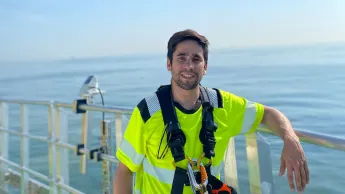‘My work is contributing to the energy transition’
- 2022-11-18
- Miriam Hoffmeyer
- Comment

By 2050, Europe aims to become the first continent where greenhouse gas emissions are limited only to unavoidable emissions and where these are fully offset. If many countries, businesses and people work together, it will be possible to limit global temperature increases. Mario Cornaló is an Argentinian engineer and DAAD alumnus who is working to support the energy transition every day.
Mr Cornaló, please tell us about the project you're working on at the moment.
Until recently I was working on the Arcadis Ost 1 windfarm, north east of Rügen, Germany’s largest island. I was employed by DEME Offshore, which was responsible for laying the foundations for the planned 27 wind turbines, as well as installing moorings and platforms. I was supervising the transportation of materials and also the progress of the construction. I looked out for risks and suggested ways of optimising the process. That work has been completed now. My next project is a windfarm off the east coast of the USA. I’ve found my dream job!
What do you particularly like about it?
The multicultural teams and the ever-changing nature of the work: sometimes I’m in the office in Antwerp, at others on offshore construction sites. In recent months I’ve not just been working in Germany and Belgium, but the Netherlands and Denmark as well. What matters most to me, though, is that my work is helping to push the energy transition forward. The European Union is aiming to be climate neutral by 2050 and Germany even aims to get there by 2045. For that to happen, offshore wind power must be expanded. Arcadis Ost 1 is planned to enter service in 2023. It will be able to supply around 300,000 German households with green energy. I really am passionately interested in the issue of climate action and have been since my time in Esslingen. That semester abroad really made its mark on me, professionally as well as personally. It made me who I am today.
How did that happen? Was there one decisive experience?
No, the process took quite a long time. I had applied for a DAAD scholarship because Germany has such a good reputation in construction engineering. The degree course in Argentina is quite restricted and classroom based, and I was amazed at how many options there were at Esslingen University. I found the module on sustainable construction interesting. In the course of that semester I realised how important sustainability is and how much harm conventional construction does to the climate and the environment. That was also the first time I got to grips with wind energy. I particularly liked the multicultural atmosphere at Esslingen, where students come from all over the world. I also loved working on group study projects. In Argentina I acquired the hard skills I need for my career, but it was in Germany that I learned the soft skills you need to work with other people towards a common goal.
You completed your master's degree at the University of Technology Nuremberg. What happened next?
The wind energy sector in Argentina is still a small one and the cards are stacked against you if you don’t have professional experience. I therefore got my first job working for a company that builds conventional infrastructure projects. I was involved in a project on a drinking water facility in my home city of Concordia. Outside of work I also volunteered for the Alumniportal as I wanted to give something back and make it easier for other people to experience being in Germany. It was still my goal to work in the wind energy sector, and I also missed the multicultural work that I had got to know in Germany. In the end I left that job and moved first to Denmark, the world leader in wind power. After a few months I got an offer from DEME Offshore, so I packed my bags and moved to Antwerp.
Have you any tips for Alumni from outside the EU who would like to work in Europe?
It’s not that easy to get a foothold in Europe as businesses are mainly interested in skilled workers who don’t have to extend their visas every three months. But it’s still achievable if you have clear goals and stay flexible. The foundations are good language skills in addition to your professional knowledge. I recommend learning not just English, but also the language of the country where you live and work. And then you need to stick at it: be active on social networks like LinkedIn and participate in conferences and workshops. Don’t be shy – make contact with managers and businesses in your field. You can also find a lot of useful information on this topic here on the Alumniportal.
Continue reading on the Alumniportal Deutschland
Find out what exactly is meant by ‘green jobs’ and the areas where you can find them, and learn about the opportunities they are creating for international professionals.
